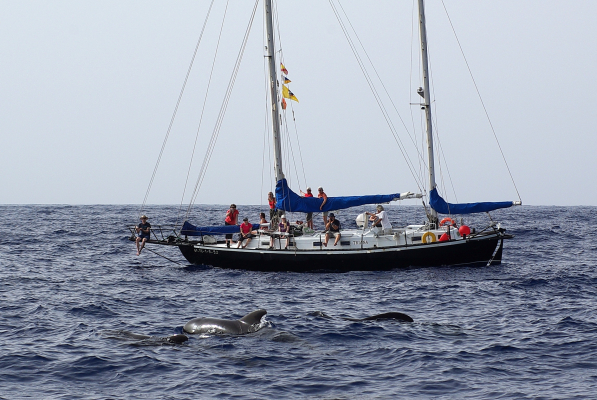Expert assistance to help minimise the risk of
to both racing crews and whales.
As the 2014/15 Volvo Ocean Yacht Race gets underway, the IWC is highlighting the measures that can be taken to avoid dangerous collisions between racing vessels and whales. These collisions, known as ship strikes, can be fatal for both crew members and whales.
The scale of the problem is hard to assess because it’s often impossible to gather accurate information at the time of the strike, but experts believe the numbers are rising. Ten collisions were reported during regattas in 2008 alone. In 2009, seven of the eight vessels competing in the Volvo Ocean Race reported hitting something, although it was not possible to confirm these as collisions with whales.
This year, the Volvo Race has seen collaboration between the IWC, WWF and VOR in an awareness-raising exercise. Information about whales will be provided to competitors, organisers and spectators, spanning the 11 worldwide port stops of the 38,730Nm race. The new handout provides background on ship strikes, information about whale behaviour, and a map of the race route highlighting areas where particular whale species are known to cluster. The experts involved in the project are hopeful that this will keep whales in the minds of those involved in the 2014/15 Volvo race.
Longer term, the IWC expert advisors would like to go further, and work with race organisers, yachting associations and crews in the early planning stages of future events. Minor alterations to proposed courses could steer races away from areas with high densities of whales, leading to mutual reduction of risk.
Little is known about the response of whales to sailing vessels and gathering information about collisions remains challenging. Providing racing vessels with containers and a small amount of preserving fluid would mean the whale skin that is often left behind after a collision could be easily retained and later analysed. The more information gathered, the clearer the picture that scientists can build, enabling more effective mitigation to be developed. Again, the benefits will be mutual.
All the information gathered by the IWC ship strike team is entered into a database that is developing a global understanding of the extent of the problem. Anyone with details of a collision is encouraged to use this publicly accessible database to ensure the IWC is aware of the incident.
A guidance document has also been produced for off-shore boating events and is available here.
To read the IWC/WWF/VOR Volo Ocean Race information handout, click here.
For more information on ship strikes click here.
To record details of ship strike on the database click here.

